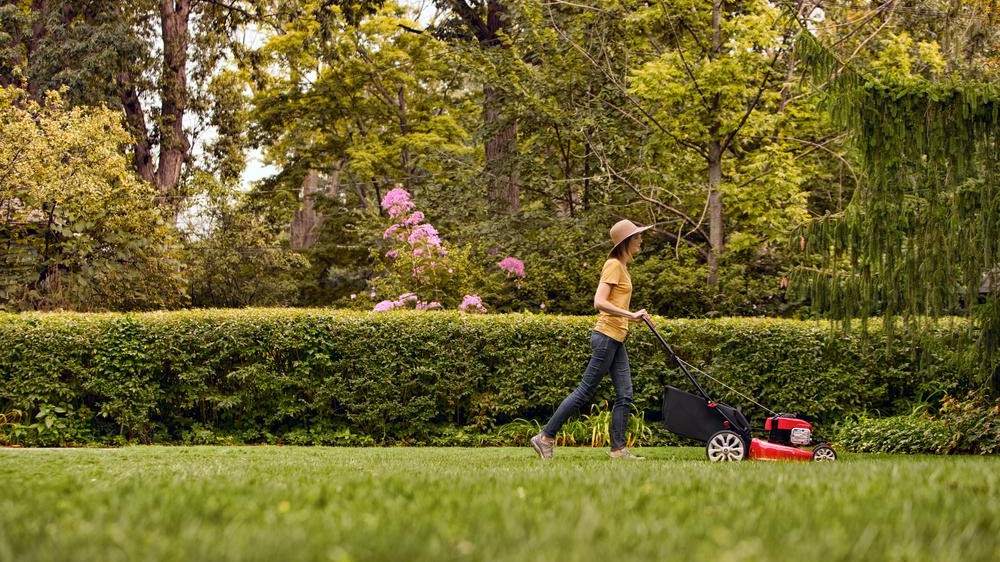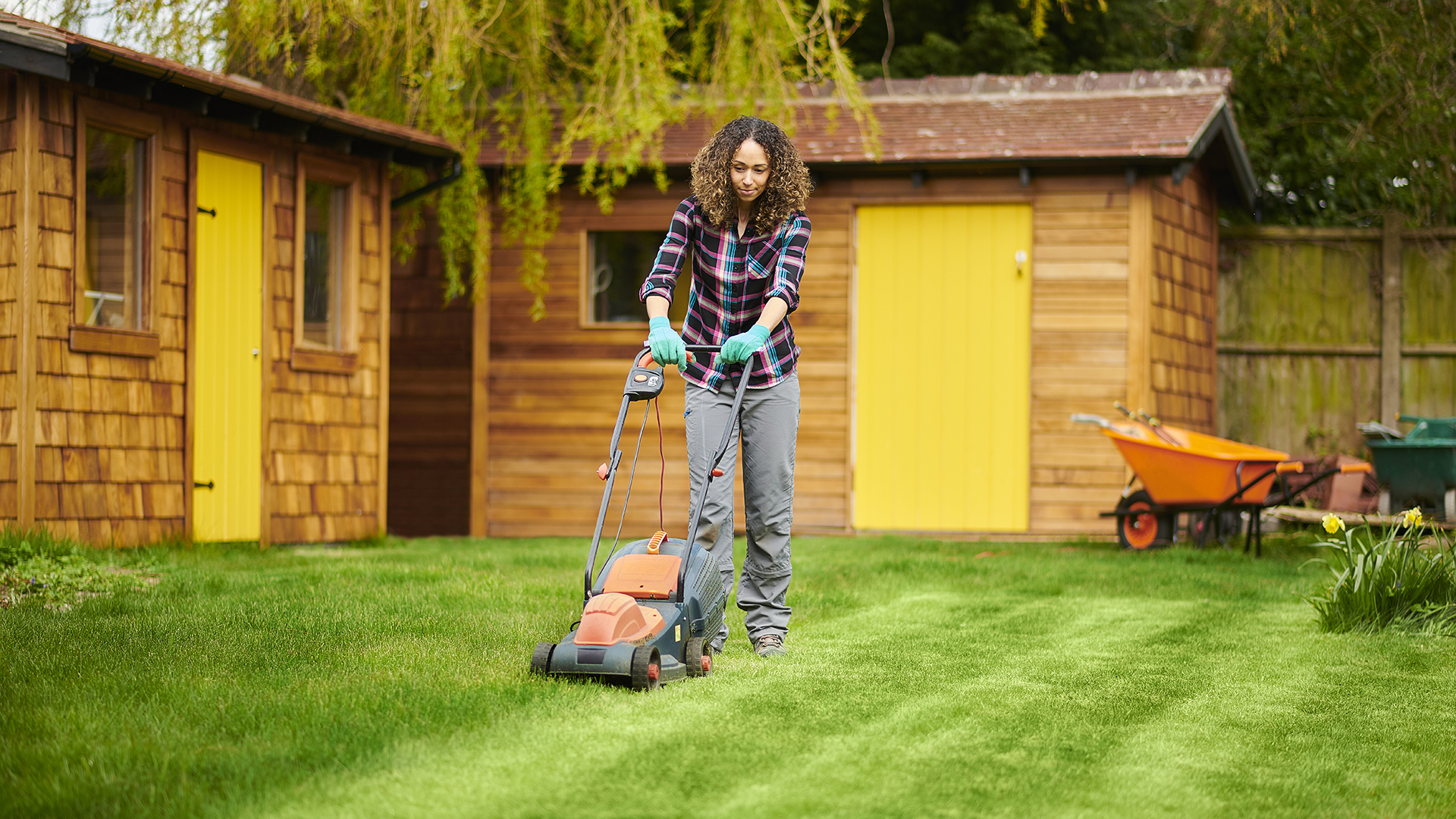If you’re going to have a big patch of grass in your garden design, the first thing you need to know is how to mow a lawn correctly. Grass that is looked after, fed and well watered will look fantastic - and knowing how to mow a lawn in the right way is the first step in the process.
According to a recent survey the average yard size in the US is 0.15 acres, and home gardeners can spend anywhere from seven to 47 days of their life mowing the lawn (that’s as much as 0.17% of your life spent cutting grass!). So it makes sense that you spend that time well, mowing your lawn in the right way.
Of course, the first thing you need is a lawn mower, such as one of the best gas lawn mowers or best electric lawn mowers. And if you need a new mower before you even get started, check out our guide to the best gas lawn mower.
Here, we’ll take a look at the whole mowing process, along with the correct tools to use, when and how often you need to cut your grass, and more.
Lawn expert David Gower Hedges, who is the chairman of the Lawn Association, explains why you should regularly mow your lawn.
“Mowing a lawn is the simplest thing we do, yet the one that can undermine any work you do to improve it. Mowing is one of our pruning techniques we have (for our native grasses) and when done regularly and correctly it simply thickens your lawn. But that’s not all. Plenty can still go wrong and it’s normally to do with the most important feature… the lawnmower blade.
Whether you use a cylinder or rotary mower, the blade sharpness is key to a healthy plant. Sharpen it irregularly and you will cause the grass blades to tear and cause stress. The plant will lose the ability to take up food and water efficiently. So, buy a spare blade and a file or angle grinder and sharpen up. Get the fundamentals right and the remainder of the year will be a breeze."
How to mow a lawn
What tools to use
Choosing a lawn mower will depend mostly on your budget, and the size of your lawn.
If you have a large area, one of the best riding lawn mowers will be a great investment, but they are not cheap. When it comes to push mowers, you can opt for one that is self-propelled, this means you don’t have to do so much pushing, so if you aren’t very fit, or simply want to make the job easier, this will be the model for you.

Some lawn mowers also mulch the clippings, leaving them to feed the grass. Again, these models usually cost a little more, but it does mean you don’t have to rake the grass up at the end - saving time and effort. Another benefit over a mower that collects the clippings in a bag or bin, is that you don’t have to dispose of the clippings.
You could also invest in one of the best robot lawn mowers - these are guided by thin wires laid in your lawn, and they mow little and often, keeping your lawn in great shape. They are quite an investment though.
How much grass should you cut?
Aside from ensuring that your mower blades are sharp (see David Gower Hedges’ comments), you should also ensure you don’t set your mower blade too high to begin with.
You might think that - like getting a haircut - if you cut the grass really short, you won’t have to mow the lawn for a long time. But, aside from leaving your grass at risk from being scorched by the sun, leaving the grass blades longer means that the roots will also grow deeper, leaving you with a more established lawn. So, yes, you might have to mow a few times more, but the quality of your lawn will be the reward. So set your mower to only cut about the top third of the grass.
This should apply to most types of grass, but there may be some exceptions.
David Gower Hedges, chairman of the Lawn Association, recommends, " Hollow tine aerate to improve soil structure and scarify to help thicken the lawn back up after initially thinning out thatch and moss. I'd also recommend using a liquid moss control to treat moss plants, but only AFTER scarification has taken place. Then, feed a lawn with a good fertilizer to enhance the soils and the lawn."
Keep yourself protected
Wear a protective shoe or boot when mowing, and eye protection or some sunglasses to help to keep flying bits of grass or earth out of your eyes. And ensure pets and small children are safely out of the way.
When should you start mowing?
Usually, you should start mowing your lawn in the spring, when it reaches around 2in tall. The same applies for a new lawn grown from seed - don’t be tempted to start cutting before it reaches this height! As we’ve already mentioned, don’t go for a dramatic cut - aim to trim off around a third of the height. For new lawns, the stress of a more harsh cut could kill it off.
How often should you mow?
You should be guided by your lawn growth. If your grass has not grown much, there’s no point mowing at the weekend because that's what you always do - you will end up cutting your grass too short and it will suffer. During the spring, when grass grows the most, you may well be mowing twice a week to keep it in check - while once it gets hot in the summer, you might only mow once a week, or even once every two weeks if you're lucky! If it’s very hot, make sure you’re not mowing in the heat of the day…
What time of day should you mow?
It’s best to mow your lawn once it is dry - so cutting it in the early morning is not a good idea as it will be wet. You’ll also find that your mower is more likely to get clogged up with the wet clippings, and leave soggy clumps of grass all over the lawn. You also need to avoid the hottest time of the day, as the sun can scorch your grass - so late afternoon or early evening is a good time to get the mower out.
When should you stop mowing?
Usually, you would carry out your last cut around the end of October - this may vary a little depending on where you live and the weather conditions. Once you start getting cold nights, the grass is likely to become dormant and will simply stop growing. You should be able to tell this just from looking at it!
Discover more guides for the garden…
Best pool heaters
Best swim spas
Best water heaters
Best patio heaters
Best hot tubs

